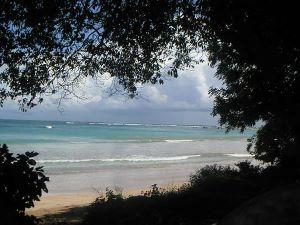Sri Lanka police have arrested 40,000 people in anti-drug operations in the past few weeks, according to Acting police chief Deshabandu Tennakoon. The campaign, known as Operation Yukthiya (Justice), features heavily-armed police and soldiers using sniffer dogs to stage nighttime raids on homes, searching public transport, seizing drugs, and arresting not only drug users and dealers, but even people whose only offense is having been arrested for drugs in the past.

Earlier this month, the UN Human Rights Council expressed its concerns with those reports, saying that: "While drug use presents a serious challenge to society, a heavy-handed law enforcement approach is not the solution. Abuse of drugs and the factors that lead to it are first and foremost public health and social issues."
And international civil society is joining in. In a joint statement last week, more than 30 global human rights and drug reform organizations including Amnesty International, Harm Reduction International, Human Rights Watch, and the International Commission of Jurists expressed their concern with the "drastic intensification" of anti-drug operations, which they say is leading to significant human rights violations.
"Alongside the Sri Lankan police, members of the armed forces have been supporting this operation, during which several human rights violations have been reported," the joint statement said. "These violations include alleged arbitrary arrests, primarily against individuals from marginalized socio-economic communities; searches conducted without warrants or reasonable suspicion; and degrading treatment including strip searches in public as well as cavity searches. The searches and arrests have been televised, in violation not only of the right to privacy (and of basic human dignity) but also of a person's right to be presumed innocent."
The groups point out that drug suspects are generally jailed after arrest, punishing them with loss of income and housing before they are even convicted of any crime, and stretching an already overcrowded prison system to the brink. Drug prisoners account for nearly two-thirds of all persons convicted of crimes, according to Sri Lanka's Department of Prisons.
"Persons are being arrested primarily under Section 54A of the Poisons, Opium and Dangerous Drugs Ordinance, an offence which is non-bailable. As a result, those arrested are bound to spend time (sometimes months) in pretrial detention, thereby exacerbating already poor conditions of imprisonment in an overburdened prison system," the joint statement said.
But the joint statement's complaint that authorities had arrested 29,000 is already outdated. Another 11,000 have been arrested since the joint statement was released in mid-month.
The human rights groups also drew attention to Sri Lanka's use of forced drug treatment, noting that more than 1,600 people have been sent to compulsory drug rehab "in violation of several fundamental rights; including the right to the highest attainable standard of health, which includes the right to consent to and withdraw from medical treatment."
And they painted Sri Lankan drug treatment centers as more akin to torture centers than medical facilities, even putting quotation marks around the words drug treatment in the Sri Lankan context.
"'Drug treatment' in these centers is abstinence-based, essential harm reduction services are not available, and persons undergo severe withdrawal symptoms without any medical assistance while in detention," the statement says. "The use of violence to discipline and punish has been reported in at least two compulsory drug rehabilitation centers which are within the purview of the Bureau of the Commissioner General for Rehabilitation and are operated by the military, which is in itself a violation of international standards," it added.
Concerns over Sri Lankan drug treatment practices are longstanding, the groups noted.
"The UN Working Group on Arbitrary Detention in its statement at the conclusion of its visit to Sri Lanka in 2017 expressed concern regarding the involvement of military personnel in drug treatment and rehabilitation, the fact that strenuous physical exercise was the core component of compulsory drug treatment, and at the lack of trained professionals to monitor the health of people in detention. Furthermore, the statement highlighted the irregularities in the judicial process by which persons were sent to drug rehabilitation centers without a medical assessment."
The Sri Lankan war on drugs is putting the country outside the mainstream of global current thinking on drug policy, the groups argued, noting that "a punitive and militarized approach to drug control contravenes recognized international human rights standards and guidelines, is ineffective to protect individual and public health, and ultimately fails to make communities safer."
The joint statement calls on the Sri Lankan government to immediately cease Operation Yukthiya, release people arrested without evidence or reasonable suspicion, release people forced into drug treatment centers, close those centers, repeal the laws that allow those centers, and end the involvement of the armed forces in drug policing and drug treatment.
That would be a good beginning at righting a policy of drug war excess. But if Sri Lankan Public Security Minister Tiran Alles can be taken at his word, then the excesses will continue.
"We will not stop this operation. We will go ahead and we will do it the same way because we know that we are doing something good for the children of this country, for the women of this country and that is why the general public is wholeheartedly with us in these operations," he told the Associated Press.
This work by StoptheDrugWar.org is licensed under Creative Commons Attribution-ShareAlike 4.0 International
Add new comment